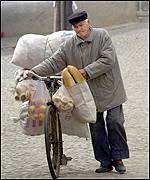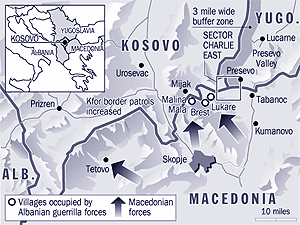Enter content here Macedonia accuses West of inaction. BBC Macedonian forces have dug in around Tetovo. Sunday, 18 March, 2001, 18:36 GMT
Macedonian Prime Minister Ljubco Georgievski has accused the United States and Germany of refusing to act against ethnic Albanian rebels attacking targets in his country.
''You can't persuade anyone in Macedonia today that the government of the United States and Germany do not know who the terrorist leaders are and what they want,'' he said. ''They could stop them acting.''
US and German forces head the K-For peacekeeping forces in the eastern and southern sectors of Kosovo which border on northern Macedonia.
The prime minister's comments came as Macedonian forces pounded rebel positions around the city of Tetovo on the fifth day of fighting there.
Reserve call-up
BBC correspondent Peter Biles, who is in Tetovo, says a constant barrage of mortar and heavy machine-gun fire was being directed from government forces' positions, towards rebel strongholds in the hills. Rebel roadblocks have been springing up around Tetovo. There has been little reported response from the guerrillas, who have threatened to spread the conflict, saying thousands of new recruits have travelled to the conflict zone to join up.
A Macedonian defence ministry spokesman announced on Sunday that the government had begun mobilising the army's reserve infantry forces as the crisis continued.
In his address to the nation, Prime Minister Georgievski announced other new measures against the rebels, including a curfew and restrictions on movement.
He said the army was using tanks and heavy artillery against the rebels near the village of Tanusevci, close to the Kosovo border.
Outside aggression
Mr Georgievski reiterated Skopje's position that the crisis was initiated by ethnic Albanians in Kosovo, and was not an internal conflict within Macedonia.
''It is aggression coming from Kosovo and we have proof,'' he said. ''This operation was well planned in advance in Kosovo.'' Macedonian protesters called for tough action. Across the border in Kosovo, Nato-led forces issued their toughest warning yet to the rebels that they wouldl face a strong response if any Nato bases inside Macedonia were threatened again.
A Nato base near Tetovo had to be evacuated when it came under fire on Friday, prompting Germany to deploy tanks inside Macedonia.
K-For commander Lieutenant General Carlo Cabigiosu said his forces would respond with "determination" to any further threat.
He said troops were now sealing the border between Kosovo and Macedonia in close co-ordination with the Skopje government.
New recruits
Guerrilla leaders in Selce, the group's headquarters near Tetovo, have said they plan to expand their territory, and are creating new branches across the country.
The BBC's Nick Wood, reporting from Selce, said young men were arriving every hour to volunteer as rebel fighters with the National Liberation Army (NLA).
Click here for a map of the region
Guerrillas have also been sealing off roads leading to Tetovo - in effect giving the NLA control of the high ground surrounding the town, says Nick Wood.
Officials say thousands of civilians have now fled Tetovo, the majority of whose residents are ethnic Albanians.  Officials say up to 2,000 Tetovo residents have fled. On Sunday, an estimated 10,000 people took to the streets of the capital, Skopje, to demand a tougher government crackdown against the rebels.
The rebels say they are Macedonian-born guerrillas who are fighting to improve the rights of ethnic Albanians there.
But some observers believe they ultimately want to unite ethnic Albanian communities in the region.
European Union foreign ministers are to meet in Brussels on Monday to discuss the crisis in Macedonia.
Meanwhile, the EU's security affairs chief, Javier Solana, is due in Skopje on Monday, and Russian Foreign Minister Igor Ivanov is also on his way to the region. Greater Albania question. BBC Macedonian Albanians deny they want to join Albania Sunday, 18 March, 2001, 17:51 GMT
As the fighting continues unabated around the Macedonian city of Tetovo, the BBC's Elizabeth Blunt looks at the aims of the Albanian nationalists backing the uprising, and of other Albanians in the region.
Log on to the internet and look at websites run by patriotic Albanians overseas, and you will see maps of a notional Albanian nation.
Present day Albania is at the heart of it, but it has been expanded in all directions to take in Kosovo, parts of Serbia and Greece, and the region of Macedonia where the fighting is now taking place.
Is this what the young men in the hills are fighting for? They say not.
Journalists who have visited their hideouts report that their declared aims are all about the situation within Macedonia - a fairer share of the country's senior positions, more control over areas where Albanians are in the majority, and, above all, their own public university, where they can teach and study in their own language.
They deny wanting to join Albania, which is a much poorer country.
The sentiment appears to be mutual.
Violence condemned
The Albanian Government has condemned the use of force by the Macedonian Albanians and says it has no claim on any part of Macedonian territory.
It is in any case too weak to be thinking of territorial expansion and in no position to incur the international disapproval this would bring.
But if the fighters do not want to join Albania, might they want to join Kosovo, and the other parts of the former Yugoslavia with a majority Albanian population?
The final status of Kosovo is still unresolved, but one possible eventual outcome might be a looser alliance with Serbia and Montenegro.
For the Albanians of Macedonia to join fellow Albanians within some new form of confederation might be a possibility, but it is still likely to be a poor second to taking what they consider is their rightful place within Macedonia.  Yugoslav army to spread out in safety zone. Daily Telegraph By Jeremy Scahill and Philip Sherwell in the Presevo Valley, Serbia
NATO is planning to authorise the controversial return of Yugoslav troops to the entire previously demilitarised security strip around Kosovo following last week's redeployment of forces in a small sector of the buffer zone.
The move will put the Western alliance on a collision course with ethnic Albanian insurgents whose guerrilla campaign to carve out a fiefdom inside the zone, in southern Serbia's Presevo Valley, has prompted the Nato rethink.
The speed with which the West has switched sides to work with Yugoslav forces following the fall of the old Milosevic regime in Belgrade has alarmed some military analysts because there has been little overhaul of the security forces since the Kosovo war.
However, the experiences that Nato troops had with the Yugoslav army during and after the Kosovo war has left them with a grudging respect for its professionalism. In contrast, they never felt at ease with the workings of a largely renegade, poorly trained and loosely allied Albanian force.
The latest decision has heightened the danger that Albanian extremists inside Kosovo or the Presevo Valley will turn their guns on Nato peacekeepers whom they accuse of betrayal, especially at a time when rebels in neighbouring Macedonia are on the offensive.
Tensions mounted in the valley ahead of a big Albanian protest rally yesterday when suspected guerrillas broke a ceasefire and fired at Serbian police posts. In a separate incident, one Serbian officer was badly hurt and another injured when their vehicle hit a land mine.
The three-mile wide Ground Safety Zone (GSZ) along Kosovo's borders with Yugoslavia was imposed by Nato after the end of the 1999 war to keep President Milosevic's military forces away from the territory. However, guerrillas of the Albanian rebel force, the Liberation Army of Presevo, Medvedja and Bujanovac (the UCPMB) turned the strip into a safe haven to launch a campaign in Albanian areas lying outside Kosovo.
Last week, more than 1,000 Yugoslav troops returned to Sector Charlie East, a three-square-mile strip of the zone on the Serbian-Macedonian border, under a deal struck by Nato to restrict rebel activities. Within 48 hours, British and Finnish troops sent to monitor the redeployment declared it a success and Nato now plans to press ahead with the return of Yugoslav security forces throughout the GSZ.
Lt Col Richard Barrons, who headed the 15-man international monitoring team, said that he expected Yugoslav troops to be allowed back into the uncontested Sector A that stretches around northern and north-eastern Kosovo "in the short-term". That leaves Sector B, which contains the three main villages where Albanian extremists were battling Serb forces in the Presevo Valley before last week's ceasefire.
Although Belgrade is pressing for an early return there too, as proof of its international rehabilitation, Nato has not yet laid down a timescale for this. In a letter to Lord Robertson, the Secretary-General of Nato, last week, Nebojsa Covic, the Serbian deputy prime minister who is spearheading Belgrade's efforts to resolve the crisis, asked Nato to allow Yugoslav forces to be deployed in other areas of the zone.
The letter, which has been obtained by The Telegraph, said that "to prevent the spread of Albanian extremism, we consider it important to continue with further relaxation of other sectors of the zone, up to sector B".
Albanian guerrillas have made it clear that they would fight any redeployment in that sector. In Lucane, a commander of the UCPMB, who identified himself as Ardian, said that if the Serb forces attempted to retake the village under the Nato plan, "we won't be awaiting them with flowers". Another young fighter said bluntly: "We'll die here rather than let them back."
In the nearby rebel headquarters in Koncul, just inside Serbia, fighters were hostile to Western journalists whom they once welcomed. Shefket Musliu, the bearded, shaven-headed top UCPMB commander, aggressively ordered us out of the ethnic Albanian stronghold.
Following heavy pressure from Nato forces and Western diplomats, Mr Musliu signed a ceasefire last week after Belgrade's new reformist government agreed to a series of measures to improve conditions for local Albanians. However, his fighters made it clear that they were extremely unhappy about a truce that few expected to hold for long.
Nato was also criticised by local Albanian civilians. In Trnava, villagers gathered at a corner store to complain about its decision to allow the Yugoslav Army back into the buffer zone. Baki Bechiri, 45, an unemployed factory worker, said: "Nato has made a mistake and we are going to suffer because of that. There will be excesses and harassment. This is the same army that was in Kosovo and they massacred our people."
Gen Nebojsa Pavkovic, the new chief of general staff who commanded Yugoslav forces in Kosovo during the war, oversaw Wednesday's re-deployment. Also included in the forces re-entering the zone were members of Serbia's elite Special Police Force and units of the infamous 7th Battalion, formerly based in Montenegro.
Lt Col Barrons, commanding officer of 3 Reg, Royal Horse Artillery, insisted that "one stipulation [of the deployment] is that commanders and soldiers should not be those who were prominent in Kosovo in 1999". |



